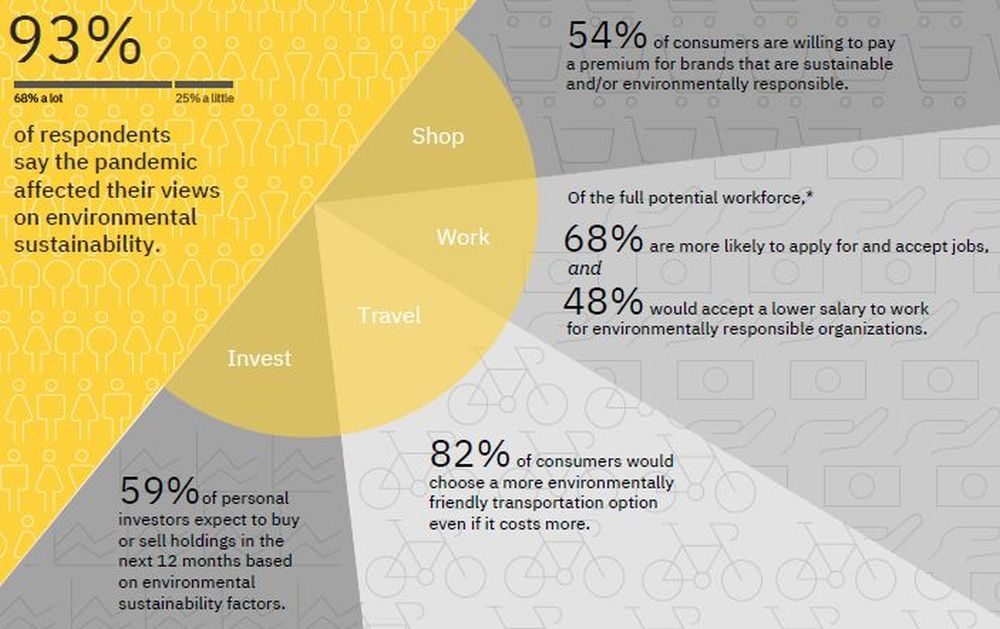The COVID-19 pandemic has elevated consumers’ focus on sustainability and willingness to pay out of their own pockets – or even take a pay cut – for a sustainable future, according to a new IBM Institute for Business Value (IBV) survey of over 14,000 consumers in nine countries.
Nine in 10 consumers surveyed reported the COVID-19 pandemic affected their views on environmental sustainability, and COVID-19 was the top factor cited in influencing their view – more than others presented such as widespread wildfires/brushfires, disasters due to weather events and news coverage on the topic.
The survey also revealed differences in consumer opinion across geographies, with Americans surveyed reporting the least concern about sustainability topics. For example, only 51 percent of US consumers surveyed said addressing climate change was very or extremely important to them, compared to 73 percent of respondents from all other countries.
“The survey showed respondents worldwide are increasingly concerned about the global climate crisis, and we have also observed businesses in many industries looking to take action to meet their customers’ and investors’ expectations and manage their own environmental goals,” said Dr. Murray Simpson, global lead for sustainability, climate & transition, IBM Global Business Services. “We see many companies beginning to make strides to build transparent supply chains or improve energy management to reduce carbon emissions with the help of innovative technologies like AI and Blockchain.”
According to the survey, many consumers are increasingly willing to change how they shop, travel, choose an employer and even where they make personal investments due to environmental sustainability factors.

The pandemic has intensified global consumers’ focus on sustainability. New IBV research shows they’re willing to pay a premium—and even take a pay cut—for a sustainable future.
Many surveyed employees are willing to accept a lower salary to work at a sustainability-conscious employer
According to the survey, 71 percent of employees and employment seekers surveyed say that environmentally sustainable companies are more attractive employers. In addition, more than two-thirds of the full potential workforce* respondents are more likely to apply for and accept jobs with environmentally and socially responsible organizations – and nearly half surveyed would accept a lower salary to work for such organizations.
At the same time, 48 percent of consumers surveyed trust corporate commitments on sustainability, with 64 percent of respondents expecting increased public scrutiny in the year ahead.
Given that one in four employees surveyed in February 2021 plan to switch employers this year, companies could face a risk of losing top talent to more sustainability-conscious competitors.
Environmental sustainability is affecting personal investment decisions
Forty-eight percent of all personal investors surveyed already take environmental sustainability into account in their investment portfolios and a further fifth (21 percent) surveyed say they are likely to do so in the future. 59 percent of personal investors surveyed expect to buy or sell holdings in the next year based on environmental sustainability factors.
Many surveyed shoppers and travelers are willing to pay more for environmental sustainability
Despite the COVID-19 pandemic’s financial impact on many individuals, 54 percent of consumers surveyed are willing to pay a premium for brands that are sustainable and/or environmentally responsible.
In addition, 55 percent of consumers surveyed report sustainability is very or extremely important to them when choosing a brand – 22 percent higher than consumers surveyed pre-COVID-19 pandemic by IBM. Slightly more than six in ten consumers surveyed said they are willing to change their purchasing behavior to help reduce negative impact on the environment, with consumers surveyed in India (78 percent) and China (70 percent) being the most willing.
With regards to travel, almost one in three respondents strongly believe their personal travel habits contribute to climate change. 82 percent of consumers surveyed globally would choose a more environmentally friendly transportation option even if it costs more, but only 64 percent of American respondents agreed compared to 95 percent of Indian and 91 percent of Chinese respondents.
Methodology
The IBM Institute for Business Value surveyed more than 14,000 adults globally from nine countries (United States, India, United Kingdom, Canada, Germany, Mexico, Spain, Brazil and China) during March 2021 to better understand consumers’ opinions and perspectives on environmental sustainability.
*Full potential workforce refers to survey respondents who are employed full-time or part-time, unemployed but currently seeking employment, or a full-time student or apprentice.
The IBM Institute for Business Value (IBV) delivers trusted business insights from our position at the intersection of technology and business, combining expertise from industry thinkers, leading academics, and subject matter experts with global research and performance data. The IBV thought leadership portfolio includes research deep dives, benchmarking and performance comparisons, and data visualizations that support business decision making across regions, industries and technologies.
RELATED STORY
Microsoft, Accenture Expand Commitment to Support Social Entrepreneurs









